How is the Internet Changing the Way You Think?
ALSO BY JOHN BROCKMAN
AS AUTHOR
By the Late John Brockman
37
Afterwords
The Third Culture: Beyond the Scientific Revolution
Digerati
AS EDITOR
About Bateson
Speculations
Doing Science
Ways of Knowing
Creativity
The Greatest Inventions of the Past 2,000 Years
The Next Fifty Years
The New Humanists
Curious Minds
What We Believe but Cannot Prove
My Einstein
Intelligent Thought
What Is Your Dangerous Idea?
What Are You Optimistic About?
What Have You Changed Your Mind About?
This Will Change Everything
AS CO-EDITOR
How Things Are (with Katinka Matson)
HOW IS THE INTERNET CHANGING THE WAY YOU THINK?
The Nets Impact on Our Minds and Future
Edited by John Brockman

First published in the United States of America in 2011 by
Harper Perennial, an imprint of HarperCollins Publishers,
10 East 53rd Street, New York, NY 10022.
First published in Great Britain in 2011 by Atlantic Books, an imprint of Atlantic Books Ltd.
Copyright 2011 by the Edge Foundation, Inc.
The moral right of the Edge Foundation, Inc to be identified as the author of this work has been asserted by them in accordance with the Copyright, Designs and Patents Acts of 1988.
All rights reserved. No part of this publication may be reproduced, stored in a retrieval system, or transmitted in any form or by any means, electronic, mechanical, photocopying, recording, or otherwise, without the prior permission of both the copyright owner and the above publisher of this book.
1 2 3 4 5 6 7 8 9
A CIP catalogue record for this book is available from the British Library.
Hardback ISBN: 978 085789 245 4
Export and airside ISBN: 978 085789 246 1
E-book ISBN: 978 085789 247 8
Designed by Justin Dodd
Printed in Great Britain
Atlantic Books
An Imprint of Atlantic Books Ltd
Ormond House
2627 Boswell Street
London
WC1N 3JZ
www.atlantic-books.co.uk
To KHM
Acknowledgments
I wish to thank Peter Hubbard of HarperCollins for his encouragement. I am also indebted to my agent, Max Brockman, who saw the potential for this book, and to Sara Lippincott for her thoughtful and meticulous editing.
Preface: The Edge Question
The Edge project was inspired by a 1971 failed art experiment. This venture was titled The World Question Center and was devised by the late James Lee Byars, my friend and sometime collaborator. Byars believed that to arrive at a satisfactory plateau of knowledge it was pure folly to go to Widener Library at Harvard and read 6 million books. Instead, he planned to gather the hundred most brilliant minds in the world in a room, lock them in, and have them ask one another the questions they were asking themselves. The expected result (in theory) was to be a synthesis of all thought. But it didnt work out that way. Byars identified his hundred most brilliant minds and called each of them. The result: Seventy people hung up on him.
A decade later, I picked up on the idea and founded the Reality Club, which in 1997 went online, rebranded as Edge. The ideas presented on Edge are speculative; they represent the frontiers in such areas as evolutionary biology, genetics, computer science, neurophysiology, psychology, and physics. Emerging out of these contributions is a new natural philosophy, new ways of understanding physical systems, new ways of thinking that call into question many of our basic assumptions.
For each of the anniversary editions of Edge, I have used the interrogative myself and asked contributors for their responses to a question that comes to me, or to one of my correspondents, in the middle of the night.
Its not easy coming up with a question. As Byars used to say: I can answer the question, but am I bright enough to ask it? Im looking for questions that inspire answers we cant possibly predict. My goal is to provoke people into thinking thoughts they normally might not have.
The 2010 Edge Question
This years question is How is the Internet changing the way you think? (Not How is the Internet changing the way we think? Edge is a conversation, and we responses tend to come across like expert papers, public pronouncements, or talks delivered from a stage.)
The art of a good question is to find a balance between the abstract and the personal, to ask a question that has many answersor at least a question to which you dont know the answer. A good question encourages answers that are grounded in experience but bigger than any experience alone. I wanted Edges contributors to think about the Internet, which includes but is a much bigger subject than the Web or an application on the Internet (or searching, browsing, and so forth, which are apps on the Web). Back in 1996, computer scientist and visionary Danny Hillis pointed out: A lot of people think the Web is the Internet, and theyre missing something. The Web is the old media incorporated into the new medium. He enlarges on that thought in the introduction.
This year, I enlisted the aid of Hans Ulrich Obrist, curator of the Serpentine Gallery in London, and the artist April Gornik, one of the early members of the Reality Club, to help broaden the Edge conversationor, rather, to bring it back to where it was in the late 1980s and early 1990s, when April gave a talk at a Reality Club meeting and discussed the influence of chaos theory on her work, and Benoit Mandelbrot showed up to discuss fractal theory. Every artist in New York City wanted to be there. What then happened was very interesting. When the Reality Club went online as Edge, the scientists were all on e-mailand the artists werent. Thus did Edge, surprisingly, become a science site, whereas my own background (beginning in 1965, when Jonas Mekas hired me to manage the Film-Makers Cinematheque) was in the visual and performance arts. Gornik and Obrist have brought a number of artists into our annual colloquy.
Their responses were varied and interesting: Gorniks (with Eric Fischl) Replacing Experience with Facsimile; Marina Abramovi , My Perception of Time; Stefano Boeri, internet is wind; Terence Koh, a completely new form of sense; Matthew Ritchie, Whats Missing Here?; Brian Eno, What I Notice; James Croak, Art Making Going Rural; Raqs Media Collective, No One Is Immune to the Storms That Shake the World; Jonas Mekas, I Am Not Exactly a Thinking PersonI Am a Poet; and Ai Weiwei, who wrote, When Im on the Net, I Start to Think.
, My Perception of Time; Stefano Boeri, internet is wind; Terence Koh, a completely new form of sense; Matthew Ritchie, Whats Missing Here?; Brian Eno, What I Notice; James Croak, Art Making Going Rural; Raqs Media Collective, No One Is Immune to the Storms That Shake the World; Jonas Mekas, I Am Not Exactly a Thinking PersonI Am a Poet; and Ai Weiwei, who wrote, When Im on the Net, I Start to Think.
A new invention has emerged, a code for the collective consciousness that requires a new way of thinking. The collective externalized mind is the mind we all share. The Internet is the infinite oscillation of our collective consciouness interacting with itself. Its not about computers. Its not about what it means to be humanin fact, it challenges, renders trite, our cherished assumptions on that score. Its about thinking. Here, more than 150 Edge contributorsscientists, artists, creative thinkersexplore what it means to think in the new age of the Internet.
Next page
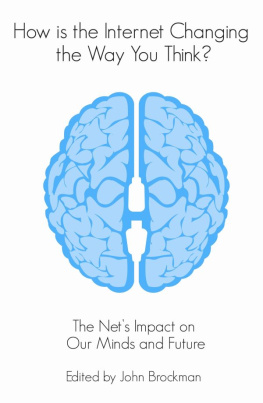
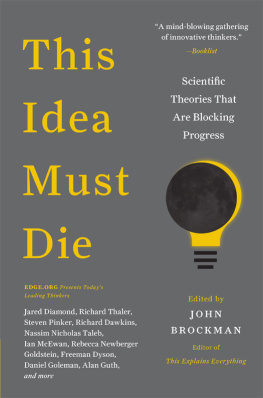
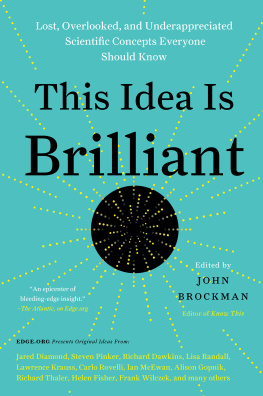
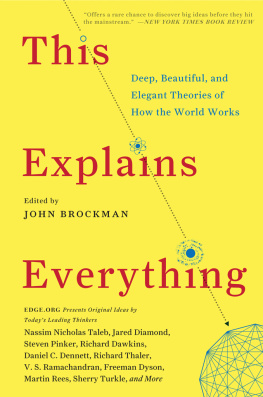
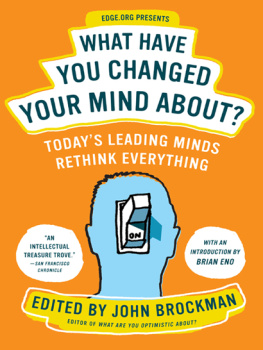

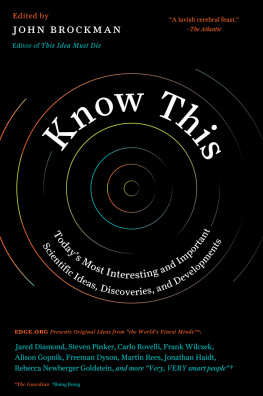
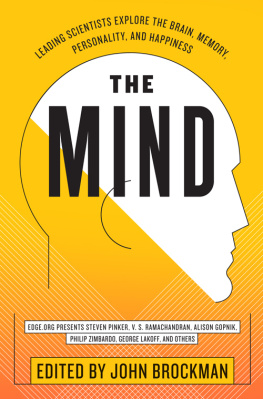
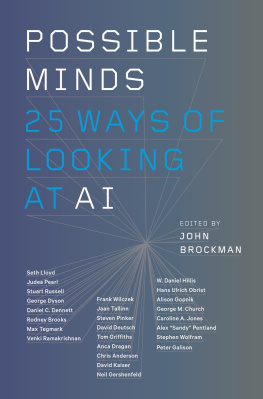
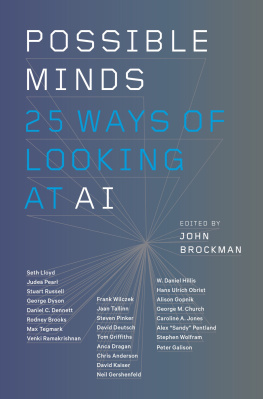
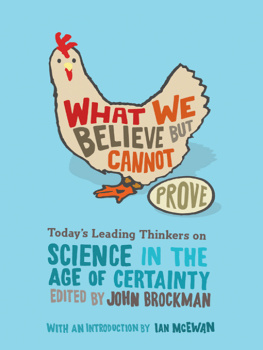
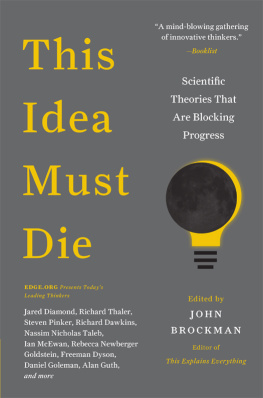
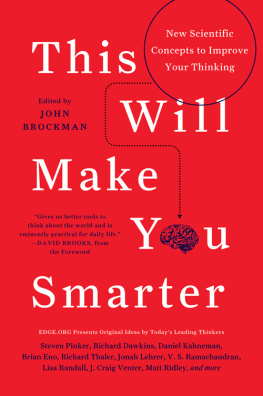
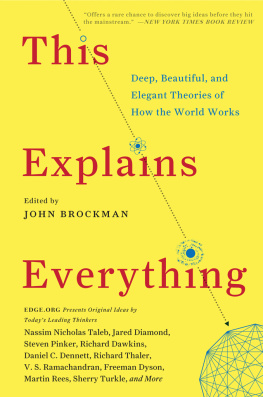
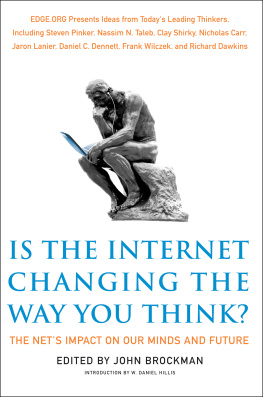

 , My Perception of Time; Stefano Boeri, internet is wind; Terence Koh, a completely new form of sense; Matthew Ritchie, Whats Missing Here?; Brian Eno, What I Notice; James Croak, Art Making Going Rural; Raqs Media Collective, No One Is Immune to the Storms That Shake the World; Jonas Mekas, I Am Not Exactly a Thinking PersonI Am a Poet; and Ai Weiwei, who wrote, When Im on the Net, I Start to Think.
, My Perception of Time; Stefano Boeri, internet is wind; Terence Koh, a completely new form of sense; Matthew Ritchie, Whats Missing Here?; Brian Eno, What I Notice; James Croak, Art Making Going Rural; Raqs Media Collective, No One Is Immune to the Storms That Shake the World; Jonas Mekas, I Am Not Exactly a Thinking PersonI Am a Poet; and Ai Weiwei, who wrote, When Im on the Net, I Start to Think.